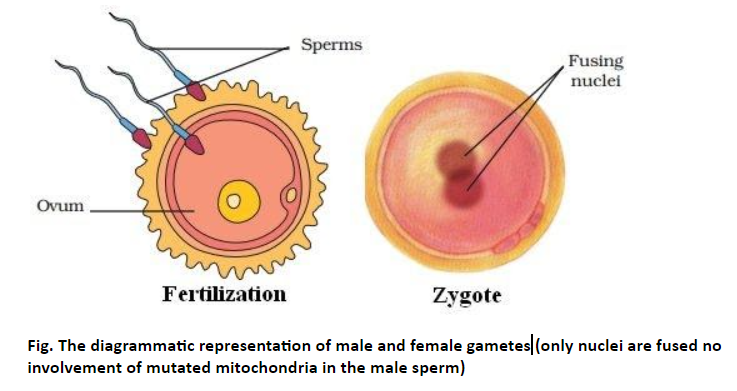
The male sperm cells undergo a mutation in the mitochondria. During segregation, the mutation is found in:
A. None of the progeny
B. One-third of progeny
C. Half of progeny
D. Whole of progeny
Answer
591.9k+ views
Hint: Here, the concept of biparental inheritance will be considered, and the transfer of genetic material from parent to the progeny.
Complete answer: Given, the male sperm cells undergo a mutation in the mitochondria and the cell undergoes division to give rise to progeny.
1. It is mentioned that mutation has occurred in the mitochondria (the mitochondrial genome).
2. During segregation, the genes are transferred only from the nuclear genome.
The nuclear genome follows the Mendelian inheritance.
3. At the time of segregation, the nuclear genome undergoes meiosis giving rise to four gametes also called male sperm cells.
4. The genetic material in the progeny is contributed by the male and female gametes. The male sperm cell will contribute to the nuclear genome only whereas the female gamete contributes the cytoplasm to the zygote.
5. Since it is only the nuclear genome that is inherited from the male in the progeny so the mutation in the mitochondria will not have any effect on the progeny and no mutation will be detected in the progeny.
The correct option is A. None of the progeny

Note: Alternatively, the question can be considered with the maternal inheritance of cytoplasmic contents to the progeny and no contribution of male cytoplasmic content in the progeny. Therefore, any mutation in the genome of mitochondria in the male sperm cells will not have any effect on the progeny.
Complete answer: Given, the male sperm cells undergo a mutation in the mitochondria and the cell undergoes division to give rise to progeny.
1. It is mentioned that mutation has occurred in the mitochondria (the mitochondrial genome).
2. During segregation, the genes are transferred only from the nuclear genome.
The nuclear genome follows the Mendelian inheritance.
3. At the time of segregation, the nuclear genome undergoes meiosis giving rise to four gametes also called male sperm cells.
4. The genetic material in the progeny is contributed by the male and female gametes. The male sperm cell will contribute to the nuclear genome only whereas the female gamete contributes the cytoplasm to the zygote.
5. Since it is only the nuclear genome that is inherited from the male in the progeny so the mutation in the mitochondria will not have any effect on the progeny and no mutation will be detected in the progeny.
The correct option is A. None of the progeny

Note: Alternatively, the question can be considered with the maternal inheritance of cytoplasmic contents to the progeny and no contribution of male cytoplasmic content in the progeny. Therefore, any mutation in the genome of mitochondria in the male sperm cells will not have any effect on the progeny.
Recently Updated Pages
Master Class 12 Economics: Engaging Questions & Answers for Success

Master Class 12 Physics: Engaging Questions & Answers for Success

Master Class 12 English: Engaging Questions & Answers for Success

Master Class 12 Social Science: Engaging Questions & Answers for Success

Master Class 12 Maths: Engaging Questions & Answers for Success

Master Class 12 Business Studies: Engaging Questions & Answers for Success

Trending doubts
Which are the Top 10 Largest Countries of the World?

What are the major means of transport Explain each class 12 social science CBSE

Draw a labelled sketch of the human eye class 12 physics CBSE

What is a transformer Explain the principle construction class 12 physics CBSE

Why cannot DNA pass through cell membranes class 12 biology CBSE

Differentiate between insitu conservation and exsitu class 12 biology CBSE




